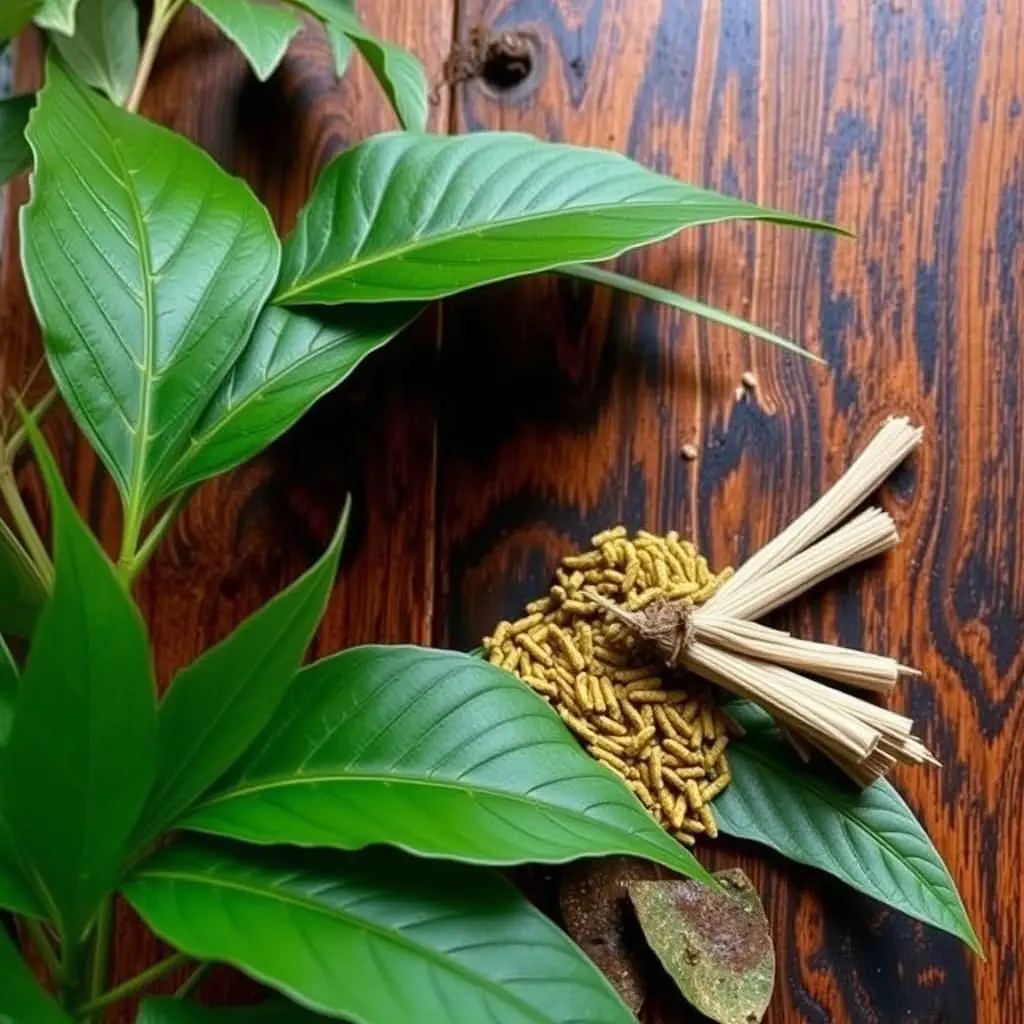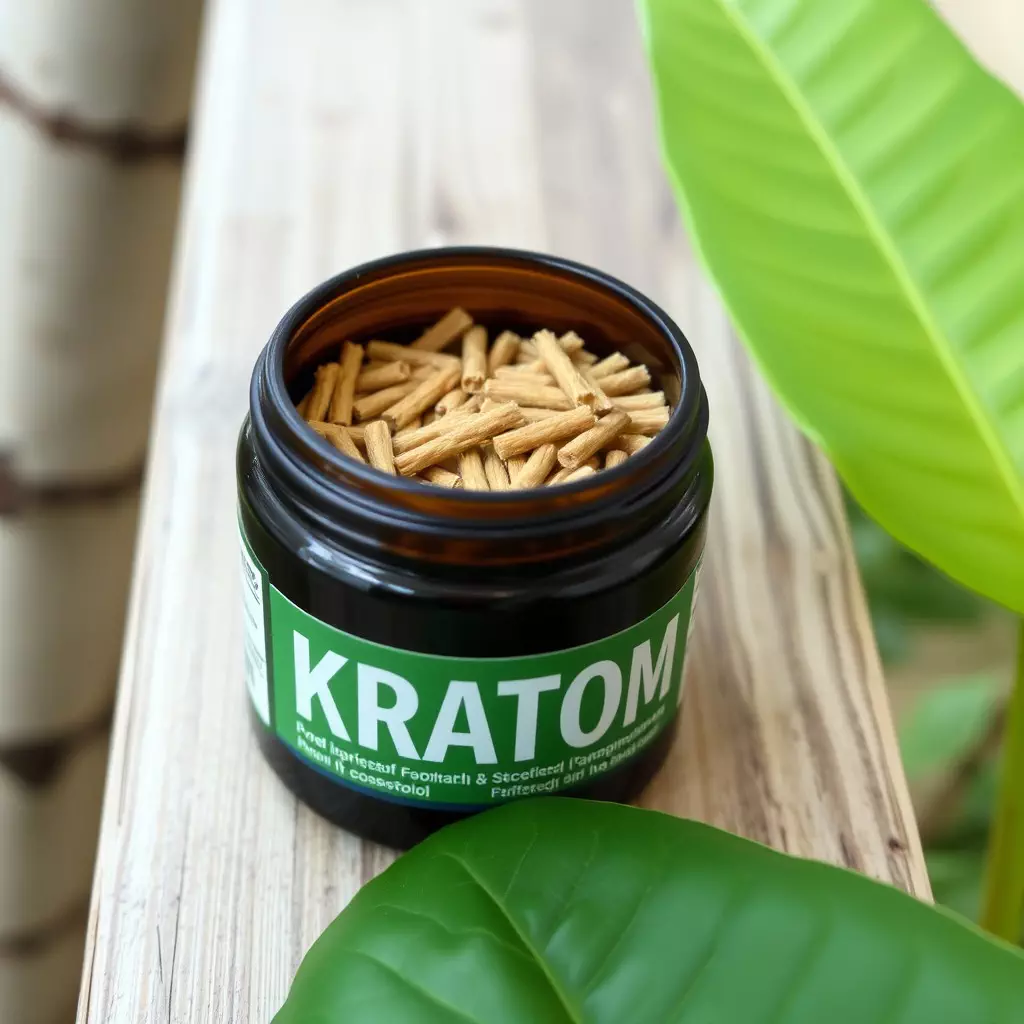Research is exploring the potential of kratom, a plant from Southeast Asia, as an alternative depression treatment, focusing on its alkaloids like mitragynine and 7-hydroxymitragynine. These compounds may modulate mood and pain perception by interacting with opioid receptors and influencing neurotransmitter levels, particularly serotonin and dopamine. Preliminary studies suggest that kratom can help regulate the body's stress response and cortisol levels, offering a natural approach to managing depressive symptoms. However, due to its potency and complex interactions, it is crucial to approach its use under professional healthcare supervision. The scientific community calls for more research to confirm kratom's efficacy, optimal dosing, and long-term effects in depression treatment with kratom. This emerging field holds the promise of alternative therapies for those managing depression, especially those concerned about traditional pharmaceutical side effects. Legal considerations also play a role in the use of kratom as a treatment option, as its status varies by country. The ongoing research into kratom's biochemical mechanisms is aimed at defining its place in mental health care, with an emphasis on patient safety and compliance with regulations.
Trauma and stress response regulation are pivotal in maintaining mental health, particularly in managing conditions like depression. This article delves into the emerging role of Kratom as a potential treatment for depression, shedding light on its biochemical mechanisms and therapeutic promise for those who have experienced trauma. As we explore the intricate relationship between Kratom and stress response systems, we uncover a promising avenue for depression treatment that merits closer examination by both researchers and clinicians. The following sections will dissect the scientific evidence and clinical implications of Kratom’s effects on traumatic stress and its potential as an adjunct to conventional therapies.
- Unraveling the Complexities of Trauma and Stress Response Regulation: A Glimpse into Kratom's Role in Depression Treatment
- Kratom's Biochemical Mechanisms: Understanding its Impact on the Body's Stress Response System
- Navigating the Therapeutic Potential of Kratom for Trauma-Related Conditions and Depression: A Closer Look at Research Findings and Clinical Evidence
Unraveling the Complexities of Trauma and Stress Response Regulation: A Glimpse into Kratom's Role in Depression Treatment

Trauma and stress response regulation represent a critical area of psychological study, particularly in the context of depression treatment. The human body’s response to trauma and stress is intricate and multifaceted, involving a complex interplay between neurotransmitters, hormones, and neural pathways. This biological cascade can be disrupted by traumatic events, leading to persistent feelings of sadness, hopelessness, and fatigue, often characteristic of depression. In recent years, there has been growing interest in the potential of kratom, a tropical evergreen tree native to Southeast Asia, as a natural treatment option for depression. Kratom contains alkaloids such as mitragynine and 7-hydroxymitragynine, which are believed to interact with the body’s opioid receptors, thereby influencing mood and pain perception. Research suggests that kratom may help regulate the stress response by modulating cortisol levels and balancing neurotransmitters like serotonin and dopamine, which are frequently imbalanced in individuals with depression. This natural approach to treatment holds promise for those seeking alternatives to traditional pharmaceuticals, particularly given the latter’s potential side effects. However, it is crucial for individuals considering kratom as part of their depression treatment regimen to do so under the guidance of a healthcare professional, as kratom itself can have effects and interactions that require careful monitoring and management. The therapeutic use of kratom in depression treatment is an emerging field, with ongoing research necessary to fully understand its efficacy, optimal dosing, and long-term safety profile.
Kratom's Biochemical Mechanisms: Understanding its Impact on the Body's Stress Response System

Kratom, a tropical deciduous tree native to Southeast Asia, has garnered attention in various circles as a potential adjunct to depression treatment protocols. Its leaves contain a complex blend of alkaloids, with mitragynine and 7-hydroxymitragynine being the most prominent. These compounds exert their influence on the body’s stress response system by modulating neurotransmitter levels and receptor activities. Specifically, kratom interacts with opioid receptors, such as mu, delta, and kappa, which are pivotal in mediating pain perception and emotional responses. This interaction can lead to a reduction in stress hormones like cortisol and adrenaline, thereby mitigating the physiological effects of stress. Furthermore, kratom’s impact on the brain’s monoamine transmitters, including serotonin, norepinephrine, and dopamine, contributes to its mood-elevating and anxiolytic properties, which are often utilized in depression treatment with kratom. By influencing these neurotransmitters, kratom can help regulate the body’s stress response, offering a potential therapeutic avenue for individuals experiencing depression-related stress and anxiety. The precise biochemical mechanisms by which kratom exerts its effects are still under investigation, emphasizing the importance of continued research to fully understand its role in the treatment landscape.
Navigating the Therapeutic Potential of Kratom for Trauma-Related Conditions and Depression: A Closer Look at Research Findings and Clinical Evidence
Recent research has begun to explore the therapeutic potential of kratom, a plant-based substance derived from Mitragyna speciosa, in addressing trauma-related conditions and depression. Studies have indicated that kratom may interact with the body’s opioid receptors, offering pain relief and mood enhancement, which are often impaired in individuals with these mental health challenges. The alkaloids present in kratom, particularly mitragynine and 7-hydroxymitragynine, have been observed to influence neurotransmitters such as dopamine and serotonin, potentially aiding in the modulation of mood and stress responses.
While preclinical and some clinical studies suggest that kratom could serve as an adjunct or alternative treatment for depression, it is imperative to approach these findings with caution. The mechanisms by which kratom exerts its effects are complex and not fully understood, raising questions about its long-term efficacy and safety. Moreover, the regulatory status of kratom varies across different countries and regions, with some classifying it as a controlled substance due to its potential for abuse and dependence. Consequently, any discussion on using kratom as a treatment for trauma-related conditions and depression must be grounded in rigorous scientific scrutiny, ethical considerations, and an understanding of the legal context surrounding its use. Clinicians and researchers are encouraged to continue investigating this area, with the aim of clarifying the role of kratom in mental health treatment while ensuring patient safety and adhering to legal frameworks.
In recent years, the intricate relationship between trauma, stress response regulation, and depression has garnered significant attention within the scientific community. The exploration of natural interventions, such as the use of kratom in depression treatment, has emerged as a promising avenue for therapeutic advancement. This article delved into the multifaceted aspects of how trauma impacts the body’s stress response system and how kratom may offer a modulatory effect, potentially aiding those suffering from depression. The biochemical mechanisms underlying kratom’s action provide valuable insights into its therapeutic potential for trauma-related conditions and depression. While further research is necessary to fully understand the implications of using kratom as a treatment option, the existing evidence presents an encouraging perspective on its role in depression treatment. As we continue to unravel the complexities surrounding these issues, it is clear that kratom may hold a significant place in the holistic management of stress-related mental health disorders.






